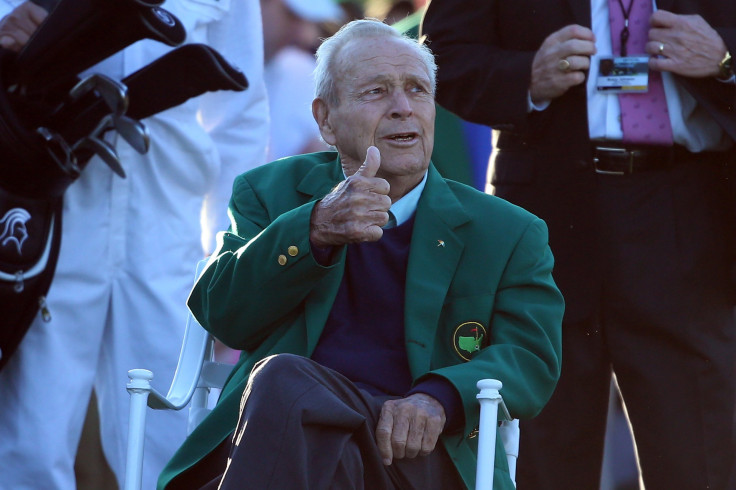What Is Arnold Palmer's Cause Of Death? Health Problems For Golf Legend Dogged 'The King' Amid Endorsement Frenzy

Golf legend Arnold Palmer, a seven-time major champion and one of the sport's most successful and charismatic players, died Sunday in Pittsburgh from complications from heart problems. He was 87.
It was perhaps those same health problems that kept him from attending this year's U.S. Open, which was also held in Pittsburgh in March, Philly.com reported at the time. Palmer was from nearby suburb Latrobe, Pennsylvania, but his longtime assistant said "The King" just couldn't be at the famed tournament.
BREAKING: Golf great Arnold Palmer has died at the age of 87, Arnold Palmer Enterprises CEO Alastair Johnson confirms
— AP Sports (@AP_Sports) September 26, 2016
"Arnold has had some serious mobility problems and has decided that it was going to be a bit too difficult for him to get down here this week," Doc Griffin said.
Palmer has also had a "few falls — trips and slips, actually," Golf.com reported in March.
He was also a cancer survivor, something which he spoke openly about after being diagnosed in 1997. "I did what the doctors told me to do and hoped for the best and was very fortunate that it worked out," Palmer reportedly said after his successful treatment for prostate cancer, according to Everyday Health.
However, regardless of any health issues, it was reportedly Palmer's uncanny knack to appeal to consumers well beyond the links which served as a conduit to what would become a vast financial fortune from endorsing a host of products and services. The way Palmer could relate to the everyday person left ad agencies practically begging for his services. The approach was simple, Palmer's longtime business manager told the Golf Channel in 2014.
“Let’s market him as your next-door neighbor, as a successful man you want to spend time with, who would give you the shirt off his back," Mark McCormack recalled of the strategy he said he came up with. "It was a brilliant strategy because it worked for decades. Nobody could knock Arnold off that endorsement mound. It wasn’t, ‘Arnold Palmer the greatest golfer in the world.’ It was, ‘Arnold Palmer the greatest guy in the world.’"
As he suspected, McCormack's strategy would pay off, and then some -- to the tune of a $675 million fortune, according to Celebrity Net Worth, which, not surprisingly credits Palmer's success off the golf course to, of course, his success on the green.
Palmer kept upping the ante for golf tournament paydays, pocketing what is still an enviable amount of cash, but back then it was a financial coup -- such as when he won $400,000 during a four-year stretch in the early 1960s that included multiple Masters Tournament victories.
It was that lasting reputation for being a winner as well as his affability that invited corporate America to court him to be the public face for their products and services. But it wasn't just any company that approached Palmer -- it was top-of-the-line, high-end companies such as Rolex, Calloway and Ketel One which paid him a handsome dowry for so-signing what they were selling, according to Men's Journal.
Still, Palmer looked to his bread and butter -- golf -- to help solidify his fortify his bank account(s), including and especially using his name to launch multiple eponymous business endeavors, such as The Arnold Palmer Design Company that fashioned countless golf courses around the U.S. and the world.
One non-golf related way Palmer commanded mammoth money was through the lemonade-ice tea mix that was named for him, although it was only recently he got paid from the drink. Palmer helped popularize the concoction more than 50 years ago, but it wasn't until 2010 that he actually earned any money off it after he trademarked his name and ultimately linked up with AriZona Beverage Company, which officially launched the Arnold Palmer Light Half & Half. While Palmer's official compensation for that deal was never confirmed, the canned and bottled drink generated at least $100 million in sales that year, CNBC reported.
It's no wonder why Palmer was a mainstay on Forbes' annual list of richest retired athletes and he placed fourth on richest athletes of all time, coming up $25 million short of fellow golfing legend Tiger Woods.
Palmer -- who turned pro in 1954 after three years in the U.S. Coast Guard following his graduation from Wake Forest University in Winston-Salem, North Carolina -- won 62 PGA Tour titles between 1955 and 1973 and is ranked fifth on the all-time list of PGA wins. He officially retired from golf in 2006 and is survived by his second wife, two daughters and six grandchildren.
© Copyright IBTimes 2024. All rights reserved.






















